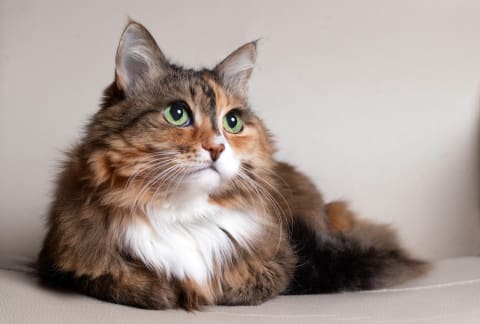Anemia is a condition which often indicates another, underlying, health issue. However, it can be treated and cured. Here, our Ventura vet team describes the symptoms, and treatments for anemia in cats.
What is anemia in cats?
Anemia refers to a drop in the number of red blood cells circulating in your cat's bloodstream. Anemia isn't a specific disease and is almost always a symptom of another, underlying medical issue.
If you notice that your cat has been acting lethargic, has been breathing rapidly and doesn't seem interested in food or treats, they might be suffering from anemia.
Symptoms of Anemia in Cats
The severity of your cat's symptoms will depend on their anemia's underlying cause, as well as the condition's severity and duration.
The most common symptoms can include:
- Jaundice (yellowish color in eyes, skin or gums if red blood cells have been destroyed)
- Pale or white gums
- Weakness
- Rapid breathing
- Loss of appetite
- Shortness of breath
- Lethargy or lack of energy
- Increased heart rate
What should I do if my cat shows symptoms of anemia?
If your cat is showing any of the above symptoms, you should book an appointment with your vet as soon as possible. They may take a series of diagnostic blood tests. This is called a complete blood count (CBC).
Your cat will need an official diagnosis and potentially more tests to identify which type of anemia he has, as well as the underlying injury, illness or disease that’s causing symptoms.
Treatment & Recovery
The underlying cause of the illness, its severity and other factors that lead to the anemia will determine the treatment path and prognosis, or recovery, for your cat.
Uncovering the appropriate course of treatment and then following it is key to curing the condition causing your cat's anemia. Your vet's diagnosis will be grounded in your cat's medical history, identified symptoms and a physical examination. This exam may involve anything from blood work to bone marrow testing.
If your cat has non-regenerative anemia, this can typically be resolved by diagnosing and treating the underlying disease. If kidney disease is the culprit, your vet may recommend long-term hormone treatments to help red blood cell production.
Your vet may also recommend that you make changes to your cat's diet and medication. They will work with you to develop a treatment plan which is tailored to you cat's needs and targets the underlying condition to cure their anemia. If your cat is diagnosed with a severe case anemia, a blood transfusion may be required.
Note: The advice provided in this post is intended for informational purposes and does not constitute medical advice regarding pets. For an accurate diagnosis of your pet's condition, please make an appointment with your vet.
Do you suspect that your cat is suffering from one or more symptoms of anemia? Contact us today to inquire about referrals and to learn more about treatment options for anemia in cats. Our team of specialists in Ventura are experienced in treating a wide range of conditions, including anemia.
Looking for a veterinary specialist in Ventura?
We're always accepting new patients, so contact our veterinary hospital today to book your pet's first appointment.Related Articles View All
Is My Cat Overweight?
You may just think of your cat as cute a cuddly, but carrying some extra weight—even just a few ounces—can impact their long-term health. Here, our Ventura vets can explain how to tell if your cat is overweight and what to do to help your cat maintain a healthier weight.
Fungal Infections in Cats - Types, Causes & Treatments
Fungal infections can pose a serious health threat for our feline friends. In some cases, your cat's fungal infection could even be passed along to you and your family. Our Ventura vets explain some causes, symptoms and treatments for fungal infection in cats.
Cat Urinary Tract Infection - What You Need To Know
Although they are rare when compared to the occurrence of Urinary tract infections in dogs, older cats may experience UTIs or other urinary tract issues that cause similar symptoms. Here, our Ventura vets share the causes, symptoms and treatments for these infections and related diseases in cats.
10 Reasons Why Your Cat is Not Eating
Cats are notorious for being picky eaters. But, you shouldn't assume that this is the only reason your kitty isn't eating. Here, our Ventura vets explain some other possible causes and when it is time for a veterinary visit.
The Types and Symptoms of Anemia in Cats
Our VMSG veterinary team will describe here the different types of anemia in cats and offer some information about their symptoms and what to do if you suspect your cat has anemia in the Ventura area.

